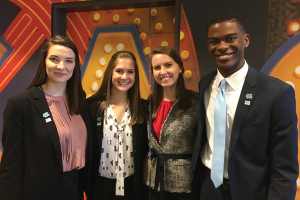Public relations team wins national PRSSA Bateman Competition

UPDATE: Carter Chambliss '18, Rachel Rhodes '18, Sarah Sturdivant '18, Sloan Taylor '18 have won the 2017 national Bateman Competition
PRSSA headquarters received 67 entries for the PRSSA 2017 Bateman Case Study Competition. Of these submissions, 15 entries received honorable mention and three were chosen as finalists and presented their campaigns to a panel of judges on Wednesday, May 10, in Chicago.
The Carolina PRSSA team Emotional WELLness placed first in the nation.
For the first time ever, members of the Carolina chapter of the Public Relations Student Society of America are heading to the national PRSSA Bateman Competition finals.
Carter Chambliss '18, Rachel Rhodes '18, Sarah Sturdivant '18, Sloan Taylor '18 and adviser Lois Boynton will travel to Chicago on May 9-10 to face teams from the University of Alabama and University of Nebraska-Lincoln. By making the finals, the team is now competing for first, second or third place in the nation.
Sixty-seven teams across the country created and implemented public relations campaigns in support of the national client, Campaign to Change Direction, and its mission to change the culture of mental health, mental illness and wellness in America.
The School of Media and Journalism fielded two teams this year. Stop the Stigma team members Emily Brice '18, Eunice Kim '19, Mackenzie Self '18 and Mikala Whitaker '17 worked with the Department of Psychology Community Clinic. The finalist team partnered with Rethink: Psychiatric Illness, a student-led campus organization.
Chambliss, Rhodes, Sturdivant and Taylor created the Emotional WELLness campaign to normalize conversations about mental health and encourage peers and faculty to take the Change Direction pledge to know the five signs of emotional distress — personality change, agitation, withdrawal, poor self-care and hopelessness.
The team implemented three promotional and educational events based on the idea of placing the ‘we’ in wellness.
"Emotional suffering is not a ‘they’ issue,” they wrote. “It’s a WE issue.”
Their campaign launched Friday, Feb. 17, with “Rethink Mental Health from the Inside Out,” a free screening of the popular Disney animated film, popcorn and an opportunity for moviegoers to sign the pledge.
Next up was “The ‘We’ in Wellness: A Short Lecture Series,” featuring three speakers from the School of Social Work and Department of Psychiatry. Each spoke briefly about mental health issues on college campuses, in the LGBTQIA community and as a neurobiological process.
Knowing pets can reduce stress and other factors of emotional suffering, the team hosted two "Paws’ and Pledge" events in high-traffic areas, giving passersby the chance to play with therapy dogs and puppies in training. Partners for these events were Eyes Ears Nose and Paws and Tar Heel Paws.
Social media also played an important role throughout the month-long campaign implementation. The team created a "Humans of New York"-style campaign using photos of and conversations with students and faculty. Each day featured one of the five signs of emotional suffering.
Posters and laptop stickers featuring the five signs also enhanced campaign visibility across campus.
The Emotional WELLness team exceeded its goals through face-to-face interaction with more than 800 students and faculty; 40,000 social media impressions; and 342 pledge signers.
The national panel of judges praised the team for thorough research, cross-campus collaboration and their focus on emotional wellness and not mental illness. The campaign earned 90 points out of a possible 100.
“The Bateman Competition is like our public relations campaigns class in overdrive,” said Boynton. “In addition to conducting secondary and primary research to create a strategic plan, these students must also implement their plan, evaluate it and submit a campaign book to the judges — all in one semester.”
In all, Chambliss, Rhodes, Sturdivant and Taylor logged in 394 hours. But they’re not done just yet.
In Chicago, the team will make a 25-minute pitch to judges that include public relations professionals and representatives from the national client, followed by a 20-minute window to answer judges’ questions.